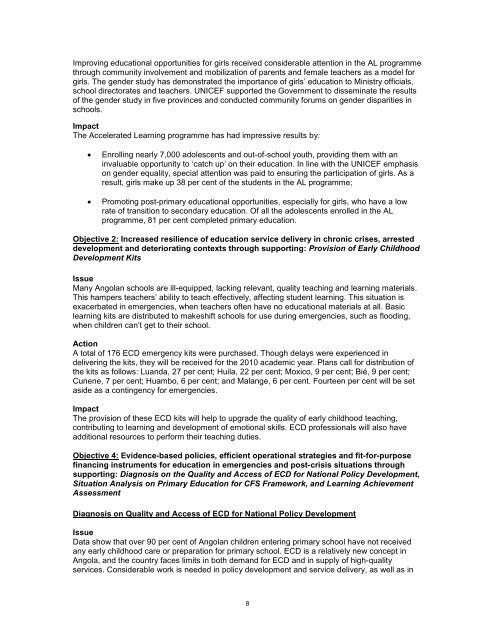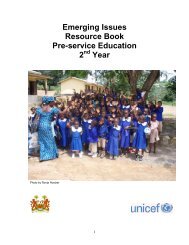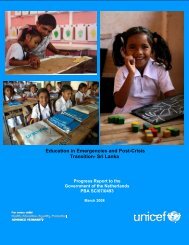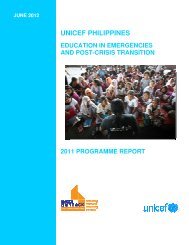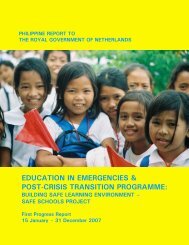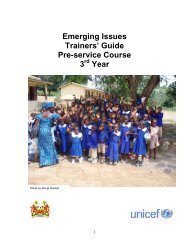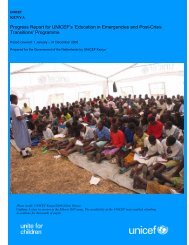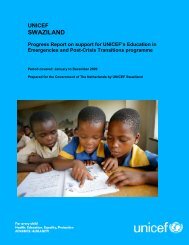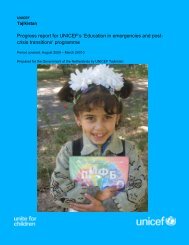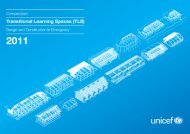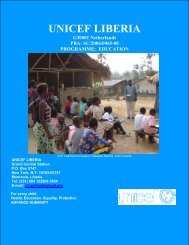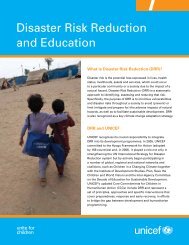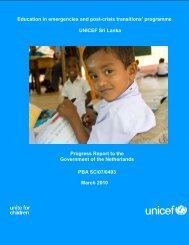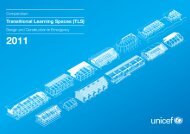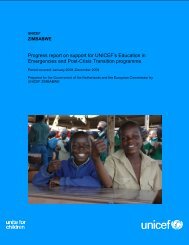Angola Progress Report 2009
Angola Progress Report 2009
Angola Progress Report 2009
You also want an ePaper? Increase the reach of your titles
YUMPU automatically turns print PDFs into web optimized ePapers that Google loves.
Improving educational opportunities for girls received considerable attention in the AL programme<br />
through community involvement and mobilization of parents and female teachers as a model for<br />
girls. The gender study has demonstrated the importance of girls’ education to Ministry officials,<br />
school directorates and teachers. UNICEF supported the Government to disseminate the results<br />
of the gender study in five provinces and conducted community forums on gender disparities in<br />
schools.<br />
Impact<br />
The Accelerated Learning programme has had impressive results by:<br />
• Enrolling nearly 7,000 adolescents and out-of-school youth, providing them with an<br />
invaluable opportunity to ‘catch up’ on their education. In line with the UNICEF emphasis<br />
on gender equality, special attention was paid to ensuring the participation of girls. As a<br />
result, girls make up 38 per cent of the students in the AL programme;<br />
• Promoting post-primary educational opportunities, especially for girls, who have a low<br />
rate of transition to secondary education. Of all the adolescents enrolled in the AL<br />
programme, 81 per cent completed primary education.<br />
Objective 2: Increased resilience of education service delivery in chronic crises, arrested<br />
development and deteriorating contexts through supporting: Provision of Early Childhood<br />
Development Kits<br />
Issue<br />
Many <strong>Angola</strong>n schools are ill-equipped, lacking relevant, quality teaching and learning materials.<br />
This hampers teachers’ ability to teach effectively, affecting student learning. This situation is<br />
exacerbated in emergencies, when teachers often have no educational materials at all. Basic<br />
learning kits are distributed to makeshift schools for use during emergencies, such as flooding,<br />
when children can’t get to their school.<br />
Action<br />
A total of 176 ECD emergency kits were purchased. Though delays were experienced in<br />
delivering the kits, they will be received for the 2010 academic year. Plans call for distribution of<br />
the kits as follows: Luanda, 27 per cent; Huila, 22 per cent; Moxico, 9 per cent; Bié, 9 per cent;<br />
Cunene, 7 per cent; Huambo, 6 per cent; and Malange, 6 per cent. Fourteen per cent will be set<br />
aside as a contingency for emergencies.<br />
Impact<br />
The provision of these ECD kits will help to upgrade the quality of early childhood teaching,<br />
contributing to learning and development of emotional skills. ECD professionals will also have<br />
additional resources to perform their teaching duties.<br />
Objective 4: Evidence-based policies, efficient operational strategies and fit-for-purpose<br />
financing instruments for education in emergencies and post-crisis situations through<br />
supporting: Diagnosis on the Quality and Access of ECD for National Policy Development,<br />
Situation Analysis on Primary Education for CFS Framework, and Learning Achievement<br />
Assessment<br />
Diagnosis on Quality and Access of ECD for National Policy Development<br />
Issue<br />
Data show that over 90 per cent of <strong>Angola</strong>n children entering primary school have not received<br />
any early childhood care or preparation for primary school. ECD is a relatively new concept in<br />
<strong>Angola</strong>, and the country faces limits in both demand for ECD and in supply of high-quality<br />
services. Considerable work is needed in policy development and service delivery, as well as in<br />
8


